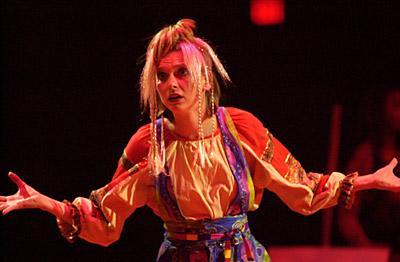It’s probably the only time you’ll see a high school cheerleader spouting off lines of Shakespeare and be able to take it seriously. Swine Palace’s production of “The Two Gentlemen of Verona” challenges the traditional perceptions of Shakespearean drama by setting the play in the tumultuous 1960s.
And cheerleaders are just the beginning–hippies, green berets, a gang of wannabe Village People, all sexually charged, comprise part of the cast. John Dennis directs a talented ensemble that successfully translates an early Shakespearean play into the psychedelic age of revolution.
“The Two Gentlemen of Verona” centers on friends Valentine, played by R.W. Smith, and Proteus, played by Adam B. Hose. Their friendship takes interesting turns as these two gentlemen leave their small hometown of Verona, Kan. for big city Milan, San Francesco. The drastic changes the characters go through inspired Dennis to place the drama in the 1960s.
“(The play) is about finding freedom and finding a whole different world,” Dennis said. “In the age of the ’60s, things happened a lot faster, there were volatile changes and more experimentation and the play reflects that as well.”
In comparison to Shakespeare’s later works, the disjointed scenes and characters’ sudden mind-set changes in “The Two Gentlemen of Verona” largely flaws the play. But Dennis uses these qualities to highlight the radical changes consistent with new environments, young love and the hippie generation.
“The storyline jumps around, it’s the sitcom of Shakespeare,” Smith said. “But we have fun with it.”
Indeed the performance is not fluid but it does well in excusing the downfall by playing classic Jimi Hendrix and the Beatles during transitions. Yet, in opening the play with sonnet-citing football players, the audience should be prepared for and welcoming of illogical twists in the plot.
The theme of “Two Gentlemen from Verona” corresponds well with college life and the culture shock that many students undergo.
“Being from Nebraska and making a big exodus to LSU, I can understand the simple pleasures of a small town and the effects of moving into a new place,” said Libby King about relating to her character and the play. King plays Julia, Proteus’ hometown girl, who secretly travels to the big city to reunite with him.
“This play is about … the change that occurs because a person moves from the town they’ve known all their lives to the unknown,” Dennis said in an interview with doctoral candidate Elizabeth Cawns.
The main characters spontaneously flit from one set of values to another attempting to generalize the test of character that change and freedom challenge. Articulate delivery by the leading actors and unique choreography help retain the audience’s attention in the midst of the flippant plot.
In addition, impressive performances by secondary characters, Jennifer Kelley as Speed, Valentine’s servant, and Allison Glenzer as Lucetta, Julia’s maid, greatly enhance the play.
Love lost, cross-dressing, sexual innuendos, the comic relief peons, the mysterious forest and love found again all qualify “The Two Gentlemen of Verona” as an enjoyable Shakespearean piece. But it’s the creative application of the 1960s and skillful cast and crew that make the production worth seeing. In short, it’s all happening.
Verona gentlemen shake up Shakespeare
November 14, 2002

Verona gentlemen shake up Shakespeare





